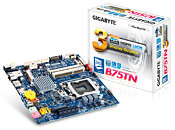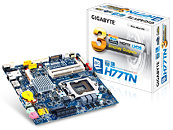Wednesday, February 20th 2013

GIGABYTE Launch Thin Mini-ITX Series Motherboards
GIGABYTE TECHNOLOGY Co. Ltd., a leading manufacturer of motherboards and graphics cards, today announced the debut of its latest motherboards series based on the Thin Mini-ITX form factor. The new GIGABYTE H77TN and B75TN motherboards enable the creation of slim and compact All-In-One (AIO) PC designs that adhere to Intel's AIO PC specification.
Featuring a low profile design that is 43% thinner than traditional Mini-ITX motherboards, GIGABYTE Thin Mini-ITX motherboards offer a full featured PC experience with performance and specification options that you'd expect from a traditional desktop PC setup. In addition, GIGABYTE's Thin Mini-ITX motherboards also offer flexible power input and IO expansion specifications that make them suitable for a broad range of commercial and industrial PC designs that also conform to Intel's Thin Mini-ITX specification."GIGABYTE's Thin Mini-ITX motherboards underline our commitment to the desktop PC market and cement our leadership position in the high growth AIO segment," commented Henry Kao, Vice President of GIGABYTE Motherboard Business Unit. "By embracing new form factors like Thin Mini-ITX, GIGABYTE is enabling continued innovation in desktop PC design while also opening doors to market segments, such as industrial PCs, that we have not traditionally serviced."
"IDC is expecting the AIO growth rate to be about 26% over the next three years. It is no surprise that AIO is the hot growth market for desktop systems in 2013 and beyond. We are thrilled to see GIGABYTE participating in the development of this important AIO ecosystem", said Steve Dallman, Intel Vice President for the Reseller Channel. "In particular, we are excited to see GIGABYTE enabling new products, based on the Intel B75 and H77 Express chipsets, for both small business and home platforms. I look forward to the new AIO systems, built upon these new GIGABYTE Thin Mini-ITX motherboards that will soon be in the market."
GIGABYTE Thin Mini-ITX Motherboards
The GIGABYTE H77TN and GIGABYTE B75TN motherboards are based on the Intel H77 and B75 chipsets supporting 2nd and 3rd generation Intel Core processors. At just 17cm x 17cm, and a mere 2.5cm high, GIGABYTE Thin Mini-ITX motherboards also integrate flexible power specifications that include a selectable panel power driver, selectable back light power including 12v and 19v options, and a wide 12v to 19v voltage input range for a variety of power source options.
GIGABYTE Thin Mini-ITX motherboards also offer excellent IO flexibility with a x4 PCI Express expansion slot accompanied by both mSATA and Mini PCIe slots offering a wide range of modern and legacy IO options.
The Thin Mini-ITX: A Quickly Evolving Eco-system
Thin Mini-ITX builds on the popular and mature 17cm x 17cm Mini-ITX form factor, adding an additional 2.5cm IO shield height limitation that ensures compatibility with thinner chassis and builds. Other optimizations such as CPU socket placement and SODIMM memory come together to make a form factor that is built to power sleek system designs that don't compromise on performance and features.
Several All-in-One chassis designs that follow Thin Mini-ITX guidelines are currently available and dozens more expected later in 2013, Most of the chassis combine touch-capable HD displays, internal cooling component and are geared to work seamlessly with GIGABYTE Thin Mini-ITX motherboards.
GIGABYTE Thin Mini-ITX motherboards make an excellent choice in a range of slim-line industrial and commercial spaces including POS systems, casino gaming PCs, industrial PCs and digital signage units. However a GIGABYTE Thin Mini-ITX motherboard is the starting point for any DIY user or enthusiast builder looking to create their own All-in-One PC.
For more information, visit the product pages of B75TN and H77TN.
Featuring a low profile design that is 43% thinner than traditional Mini-ITX motherboards, GIGABYTE Thin Mini-ITX motherboards offer a full featured PC experience with performance and specification options that you'd expect from a traditional desktop PC setup. In addition, GIGABYTE's Thin Mini-ITX motherboards also offer flexible power input and IO expansion specifications that make them suitable for a broad range of commercial and industrial PC designs that also conform to Intel's Thin Mini-ITX specification."GIGABYTE's Thin Mini-ITX motherboards underline our commitment to the desktop PC market and cement our leadership position in the high growth AIO segment," commented Henry Kao, Vice President of GIGABYTE Motherboard Business Unit. "By embracing new form factors like Thin Mini-ITX, GIGABYTE is enabling continued innovation in desktop PC design while also opening doors to market segments, such as industrial PCs, that we have not traditionally serviced."
"IDC is expecting the AIO growth rate to be about 26% over the next three years. It is no surprise that AIO is the hot growth market for desktop systems in 2013 and beyond. We are thrilled to see GIGABYTE participating in the development of this important AIO ecosystem", said Steve Dallman, Intel Vice President for the Reseller Channel. "In particular, we are excited to see GIGABYTE enabling new products, based on the Intel B75 and H77 Express chipsets, for both small business and home platforms. I look forward to the new AIO systems, built upon these new GIGABYTE Thin Mini-ITX motherboards that will soon be in the market."
GIGABYTE Thin Mini-ITX Motherboards
The GIGABYTE H77TN and GIGABYTE B75TN motherboards are based on the Intel H77 and B75 chipsets supporting 2nd and 3rd generation Intel Core processors. At just 17cm x 17cm, and a mere 2.5cm high, GIGABYTE Thin Mini-ITX motherboards also integrate flexible power specifications that include a selectable panel power driver, selectable back light power including 12v and 19v options, and a wide 12v to 19v voltage input range for a variety of power source options.
GIGABYTE Thin Mini-ITX motherboards also offer excellent IO flexibility with a x4 PCI Express expansion slot accompanied by both mSATA and Mini PCIe slots offering a wide range of modern and legacy IO options.
The Thin Mini-ITX: A Quickly Evolving Eco-system
Thin Mini-ITX builds on the popular and mature 17cm x 17cm Mini-ITX form factor, adding an additional 2.5cm IO shield height limitation that ensures compatibility with thinner chassis and builds. Other optimizations such as CPU socket placement and SODIMM memory come together to make a form factor that is built to power sleek system designs that don't compromise on performance and features.
Several All-in-One chassis designs that follow Thin Mini-ITX guidelines are currently available and dozens more expected later in 2013, Most of the chassis combine touch-capable HD displays, internal cooling component and are geared to work seamlessly with GIGABYTE Thin Mini-ITX motherboards.
GIGABYTE Thin Mini-ITX motherboards make an excellent choice in a range of slim-line industrial and commercial spaces including POS systems, casino gaming PCs, industrial PCs and digital signage units. However a GIGABYTE Thin Mini-ITX motherboard is the starting point for any DIY user or enthusiast builder looking to create their own All-in-One PC.
For more information, visit the product pages of B75TN and H77TN.


17 Comments on GIGABYTE Launch Thin Mini-ITX Series Motherboards
unless someone buys a server sized copper cooler.
Celeron/I3 Cooler
I5/I7 cooler
I haven't talked to Gigabyte since around Christmas, but I still pay attention to them, for sure. Here's a video they made about these boards:
Also is that a 90 degree bent PCIe 1x?
you should talk to them for a copper core one
my cpu came with a aluminium chunk type since its 95W, but being india, it was screaming loud all day, so i talked to them and they had the 4heatpipe coper base one shipped to me. in a week :D
I've tried to make sense of why what how the cooler changes, but I don't think it really matters. So while he doesn't make much sense :p, it's fitting.
:roll:
There is some nice looking THIN coolers for 1155 on newegg that would go nicely with these boards.
anyone knows how much is the chassis, and what TDP cpu's the cooler can support?
I am looking to built another low power cheaper rig to populate my homelab network further with more physical hardware plus screw around with a dedicated DC, router etc so the more options the better.